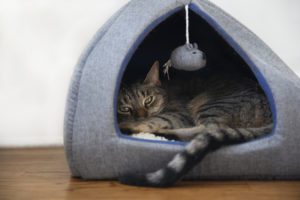Common Signs of a Cat in Labor
Do you have a cat who is expecting kittens? Would you know how to tell if she has gone into labor? If this is your first time caring for an expectant mother cats, it’s crucial to learn the signs of labor so you can recognize them as soon as they begin.
In the article below, we’ll walk you through the basics you need to know about recognizing labor in your cat. With the help of this information, you’ll know when it’s time to help your cat prepare for her kitten delivery.

Early Signs of Cat Labor
- Loss of Appetite: Although a pregnant cat will likely have a voracious appetite throughout the pregnancy, she will have a decrease in her appetite as she gets closer to her delivery date. This is usually because of the weight of the kittens in her body, but it may also happen because she is feeling anxious, uncomfortable, or nauseated due to the later stages of her pregnancy. Her appetite should return normally after the kittens have been born.
- Swelling Mammary Glands: Swollen mammary glands occur throughout a cat’s pregnancy, but they increase in size considerably during the last week of the pregnancy before labor begins. When your cat is within a couple of days of giving birth, her nipples will secrete milk for the first time as her body gets ready to nurse her kittens. She may lick this milk off herself, or she may not; if she does not, you may want to use a slightly warm washcloth to very gently remove it for her. This is not necessary, but it can help your cat with the discomfort of dried milk on her nipples.
- Nesting Behavior: Some cats may start showing nesting behaviors as soon as they become pregnant, but most won’t have this sign until closer to the due date. They may gather items from around your home or may look for cozy, secluded spots in the house in which to have their kittens. It’s a good idea to create a space for your cat ahead of time, so you can take some of the stress off of her while she is nesting. Give her a comfortable nesting box with soft blankets inside, and make sure it is away from any drafts for the safety of the newborn kittens.
Later Signs of Cat Labor
- Behavioral Changes: Behavioral changes can occur throughout pregnancy but will increase significantly when your cat is within a week of giving birth. In the last couple of days before the kittens are born, your cat will likely start hiding, often in her nesting box. She may also seek your attention more often than she usually does because she trusts you and expects you to help comfort her during the birth of her kittens. Either way, give your cat the attention or space she needs while still keeping a close eye on her at this time.
- Dropping Temperature: An adult cat’s body temperature can range anywhere from 100 to 102.5 degrees Fahrenheit. When a cat is about to give birth, her temperature will suddenly drop to around 99 degrees Fahrenheit. This sign occurs most commonly within the last day before the kittens are born, so it’s a great way to tell that a cat is about to give birth. However, your cat may be especially sensitive at this time, so she may not let you get close enough to take her temperature. If not, it may be better to avoid stressing her and instead look for other signs of pregnancy.
- Licking and Pacing: When your cat is within a few hours of giving birth, she will have discharge and her water will break. This will cause her to lick her genital area almost constantly, which is an excellent indication that the kittens are coming very soon. Once the actual labor begins, your cat will start pacing and howling, which is usually a sign that she is in pain from the labor. Although it can be hard to watch her go through this, she will eventually give birth to her kittens and will be able to settle down with her new babies as well.

Conclusion
Now that you’ve had a chance to read through this information, you may have a better idea of what a cat in labor looks like. It’s also a good idea to look up videos of cats going into labor so you can learn how to spot the subtle early signs as soon as possible, too.
If you have any further questions or concerns about your pregnant cat or her kittens, talk to your vet for more information. Your vet will be ready to help you with guidance and advice every step of the way so your cat’s delivery can be a smooth one.

